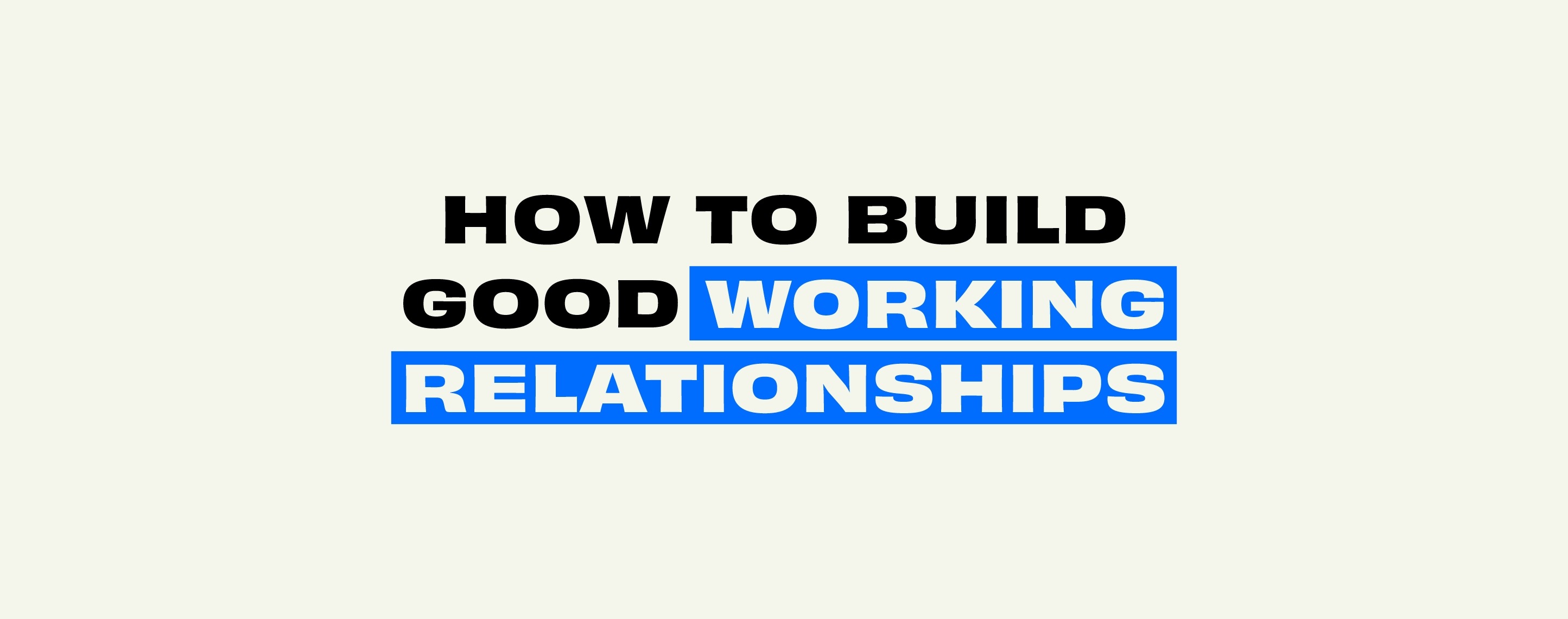
Team building, teamwork, and a positive atmosphere are all buzzwords that surround the workplace. Every company wants good working relationships within the fold, and workers want to have them.
So, let’s look at the definition of good working relationships, why they are essential, and how everyone can pull together to create — and maintain — them.
How to Define a Working Relationship
Relationships are how two or more people connect and how those people or groups of people behave towards each other.
Personal relationships are distinct from working relationships, yet both are crucial to our success and wellbeing. Family and friend relationships tend to be more emotional and personal. Working relationships are often more formal with teamwork, productivity and a sense of purpose driving a company forward.
All jobs involve human interaction, both digital and face-to-face, and even the most solitary of freelance workers needs to build kinship with people.
Why Are Good Working Relationships Important?
Being brilliant at your job can take you so far; building good working relationships is one of the most critical aspects of your work. Good working relationships foster:
- Teamwork: Respect, honesty, and good communication will positively impact team member productivity.
- Morale: Mutual respect and goodwill can ease internal conflicts in the work environment, keeping people happier.
- Productivity: Happy team members work better together. Teams producing better results enjoy increased job satisfaction, amplifying the workplace’s feel-good factor.
- Personal growth: Less time bickering means more time developing skills, including pooling and sharing knowledge with colleagues.
How You Can Build and Maintain Good Working Relationships
A great workplace environment and working relationships require time to make and maintain. As the saying goes, it takes a lifetime to build a good reputation, but you can lose it in a minute.
With time and patience, these steps can bring excellent results in the workplace.
Keep the Communication Channels Open
Communication is a two-way thing. Listening is as essential as talking, if not more so. Be interested in co-workers and managers and try to see and issues from their point of view.
Get to know and understand your colleague’s personal circumstances and empathise with their situation. Be sensitive when people are going through challenging times, and look for nonverbal signs they may be struggling, down, or need support.
Always take a deep breath before responding to inflamed situations, and take care with your words when responding to colleagues. People need to feel they can come to you with problems and trust you to treat them fairly.
Remember to offer up some of your experiences and struggles, so people see you identify with their situation. A conversation is a two-way discussion.
Build Trust Through Consistency
Trust fundamentally underlines any relationship. Fulfil promises, offer support, and help colleagues when appropriate. These behaviors should be on display consistently and across the team so everyone can see how trustworthy you are.
Make time for everyone, and not just your superiors, if you want everyone to trust you.
Be a Supporter — Positivity Brings Positivity
Mutual support and goodwill go a long way in the workplace. Praising achievements and offering to help colleagues will establish a positive culture.
Compliment people’s work. If you are more experienced than other staff, mentor and coach them when you can, and if they want your input. Be proactive and help where you can without being asked.
Be Positive in All Your Interactions
A positive attitude is infectious. Teammates will respond favorably in stressful situations or with deadlines approaching if everyone keeps an upbeat outlook.
Affirmative and optimistic demeanors can inspire co-workers, who may come to you for guidance or assistance, further bonding teamwork values.
Set High Standards and Stick To Deadlines
Your workload directly impacts colleagues. You can only build positive working relationships if you deliver quality work on time. Make sure you deliver on promises, like following up on work, and turn up on time to meetings.
Setting high standards demonstrates you are a professional that adds value to the company. A fantastic working relationship and teamwork are not far away if you add empathy and a supportive but respectful ear on which co-workers can rely.
Know the Boundaries
Companies have varying rules in the work environment, from casual and friendly to formal. Ensure you know your employer’s guidelines and culture — human resources can usually help.
Always remain conscious that work and personal relationships are different wherever you work. Don’t overstep the mark, or you risk damaging those carefully-built bonds. Self-awareness is critical to building team bonds.
Don’t Lose Trust by Gossiping
A guaranteed way to lose someone’s confidence and destroy positive workplace relationships is to gossip about your fellow team members.
Don’t engage with gossip; try to change the subject.
If you are the person that has a problem with a teammate, arrange a one-on-one meeting with them and talk openly and politely about the issue. If things don’t improve, involve a manager or superior, and remain professional.
Building Good Working Relationships
It’s not easy to build a good working relationship with everyone in every team. However, following these guidelines will help you navigate the most tricky situations and foster a winning environment.
And don’t forget, maintaining good relations is like a thriving bank account. Don’t forget to keep paying interest.


